Share a Bedroom with a UNESCO World Heritage Site at Hotel Peristil in Split
January 27, 2021 - I have found strange things in my hotel rooms over the years, but nothing quite like at Hotel Peristil in Split - the outer wall of a Roman Emperor's palace.
It is a strange thing being a tourism blogger living in a tourism country.
The perspective is different.
What tourists see as a once in a lifetime experience are everyday experiences to the local resident. I first fully appreciated the difference over three years after I started the Total Hvar website in 2011. Several years later, I was invited by Karin Mimica of Gastronaut to join her foodie media club for a three-day tour of my adopted island. It was quite a trip, and this was only the first day. My perspective of Hvar changed forever that day, and I like to think it made me a more effective travel writer, as I had seen my island through tourist eyes.
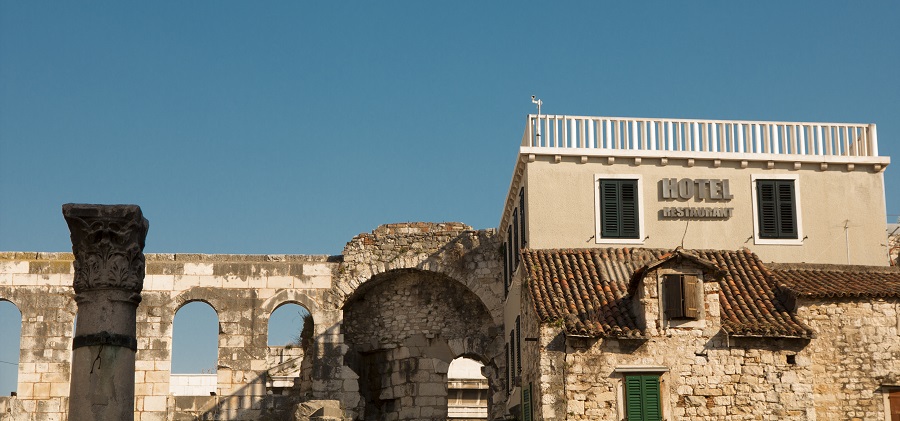
I have always had the same strange feeling about Diocletian's Palace in Split. For years, I didn't even know that it was a UNESCO World Heritage Site, such was the level of tourism promotion in the city a decade ago. In truth, especially in the evening in winter, I found the palace a little intimidating. There were few bars, everything was dark, and there were some parts best avoided.
The transformation in the last ten years has been a joy to watch, and today, Diocletian's Palace is one of the coolest places to hang out on the Croatian coast.
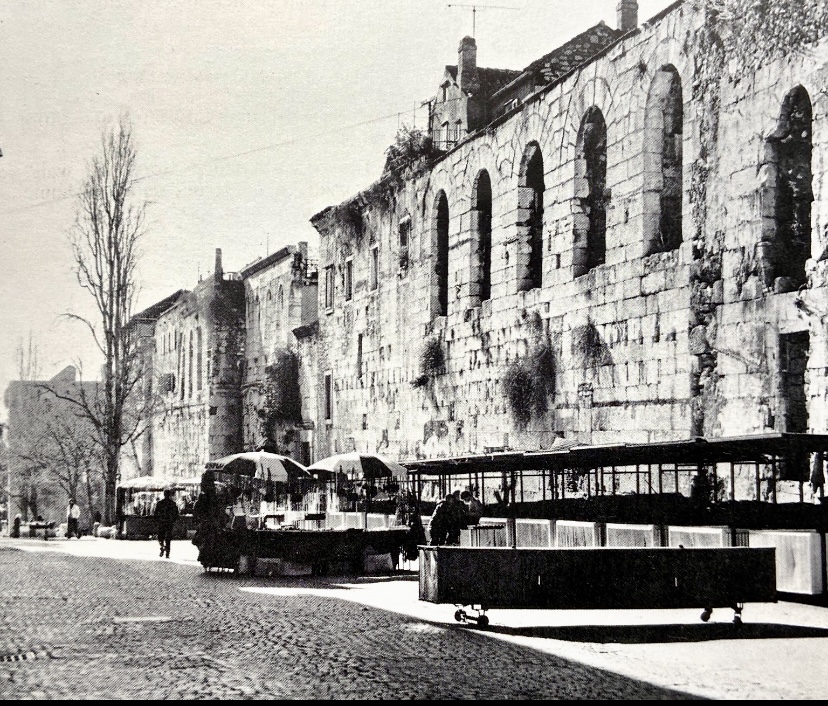
For years, I walked around the palace going about my business, sharing those historic alleys with an ever-increasing throng of tourists learning more about this Roman Emperor's incredible retirement home. I smiled often as I overheard a not-uncommon question at the end of a tour of Diocletian's Palace:
"But where is the actual palace? Can we visit that now?"
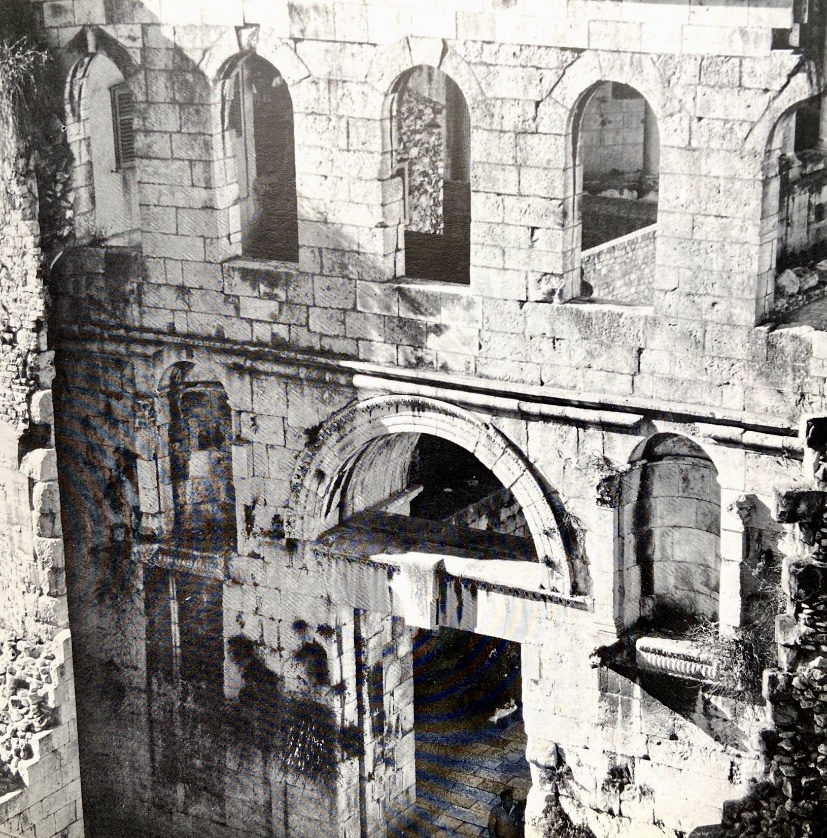
Thousands of years of history which you take totally for granted as a local, for it is with you every day. It was only when I finally did my own guided walking tour of the palace that I saw the destination - like Hvar before it - through tourist eyes.
And then, last autumn, I had a rather pleasant - and very private - rendezvous with 1,700 years of history in the most unlikely of places - my hotel bedroom.
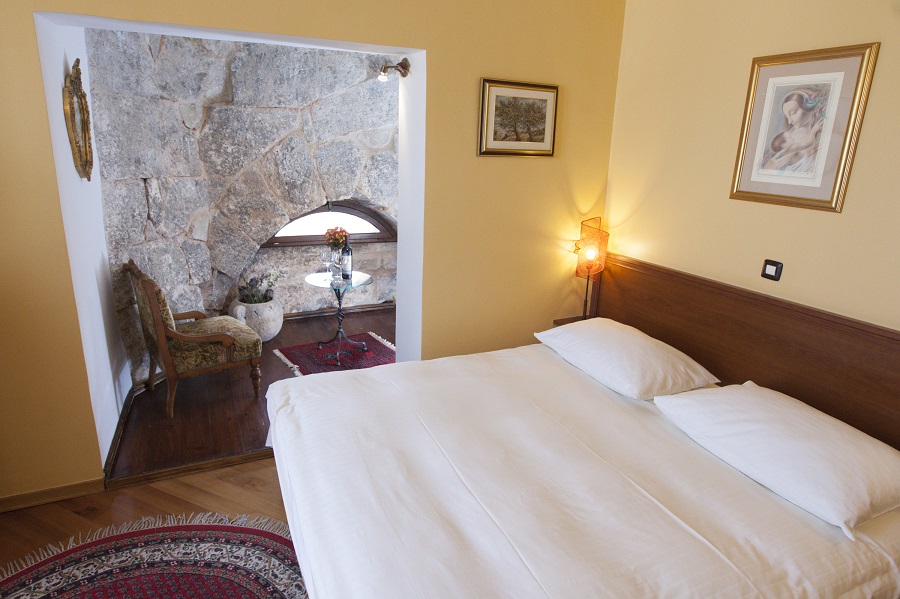
My normal Split pad was unavailable, and so I decided to check out a small hotel which had mildly fascinated me for years, but which I had never visited - Hotel Peristil. Just 12 rooms in all, the hotel is perched on one of the original outer walls of the original palace.
When I entered the room, something quite spectacular awaited. Although I had reserved a single, it seemed that I would be sharing my room after all - with an original Roman outer wall from Diocletian's Palace, which sat majestically near a delightful side room just off the bedroom.
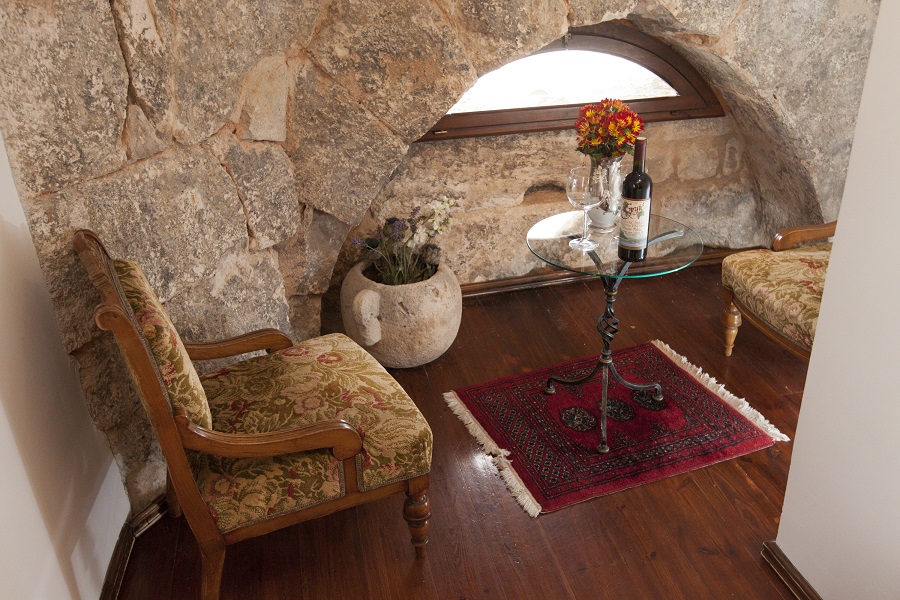
Here I was, just metres from every attraction in the palace, the ferry, the riva and the green market, so close to all the tourist throngs, and yet a world away.
Rather than dive into my laptop as I planned, I decided to take a break and savour the moment with a glass of wine (ok, three) sat in my temporary living room next to 1700 years of history. A very private moment of contemplation, as life in Split continued around me.
It is moments like that which - for me at least - make the greatest memories in travel.
Some time later, the bottle empty, I returned to work, but the memory of that private audience with history remains one my highlights of 2020.
You can learn more about Hotel Peristil here.
For the latest news from Split, follow the dedicated TCN section.
Meet Melissa Paul, Owner of Croatia's First Digital Nomad Visa
January 26, 2021 - An historic day for digital nomad tourism in Croatia - meet Melissa Paul, proud owner of Croatia's first digital nomad visa. Find out how she did it.
It has been quite a day in the world of digital nomads in Croatia.
After Prime Minister Andrej Plenkovic delivered on his promise to introduce a visa for digital nomads in Croatia last year by pushing changes to the tax code and Aliens Act, effective January 1. The final details were imminent, as was the promised online application process, with a timeframe of the first quarter of this year the target for the introduction of the visa.
And then, just before lunch - this from the man whose open letter to Plenkovic asking for the visa to be introduced got the ball rolling 199 days ago - Jan de Jong: US Citizen Gets First Croatian Digital Nomad Visa.
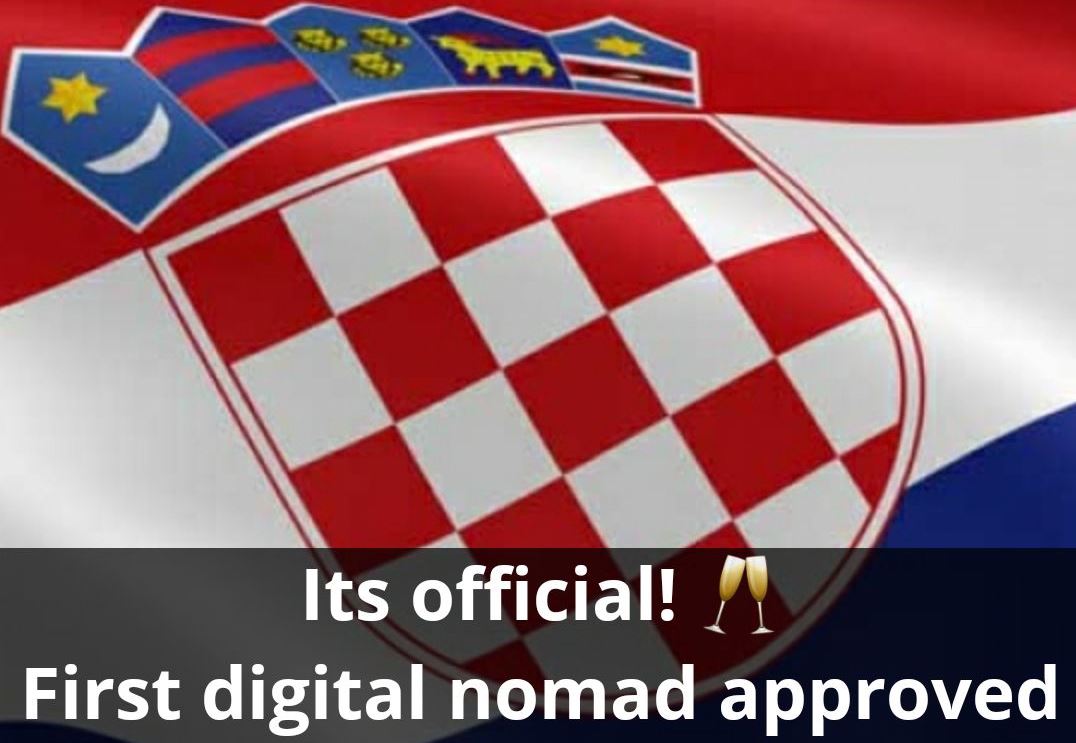
Jan's news - delightful as it was - was a little thin on detail. Who WAS this successful digital nomad visa bearer, and how did he/she do it?
Some phone calls were made, and our groundbreaking nomad was tracked down to Istria, and the town of Labin. Not only that, but Melissa Paul was more than delighted to tell her story and explain in great detail the process and the documentation required.
Melissa Paul is a brand storyteller, social media manager, and blog editor for design, travel, and lifestyle businesses.
Raised in Southern California, Melissa she was born craving adventure and kept traveling east to find it. From the mountains of Arizona to the big cities of Los Angeles, New York and Philadelphia, Melissa managed to get all the way to Croatia, first landing on the island of Krk before falling in love with the hilltop artist town of Labin, Istria. In the six years she’s called Croatia home Melissa has renovated an old stone house and learned the benefits of slowing down to enjoy the beauty of everyday life in Croatia.
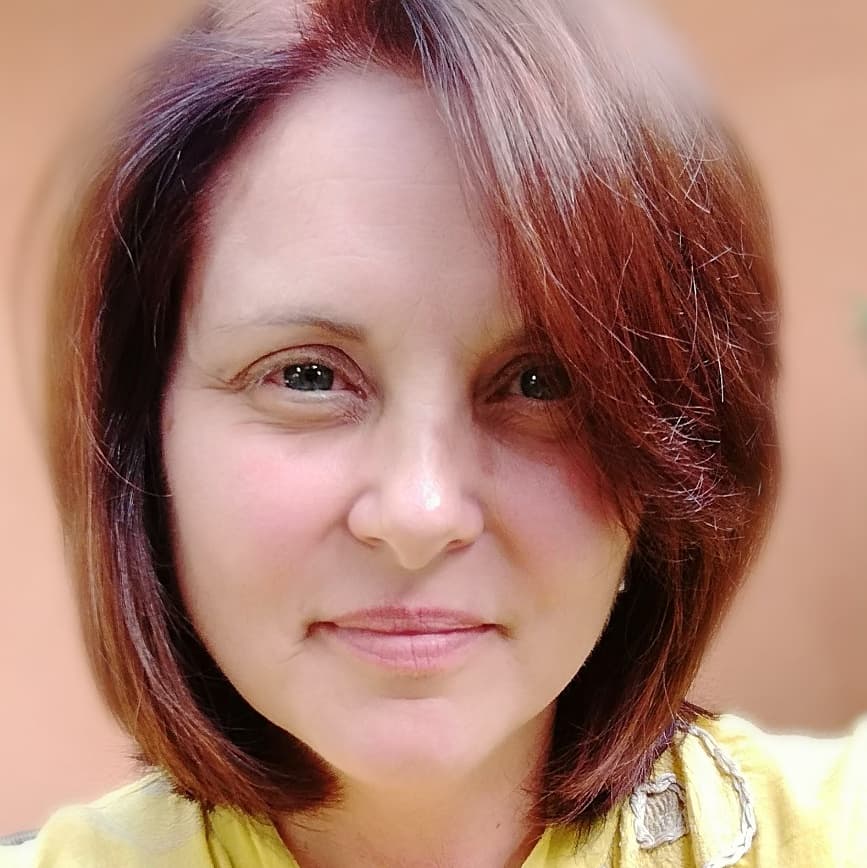
1. Let's start at the beginning. Why Croatia? What are you doing here and how long have you been here?
I came to Croatia in 2014 with my then husband, seeking a slower lifestyle in his parents’ home country. We divorced in early 2018, but I couldn’t imagine leaving my home, neighbors, and friends in Croatia!
2. As an American, you obviously have residency issues without the digital nomad visa. What was your particular situation?
Yes, it can be, and has been, challenging for third-country nationals. Originally, as a spouse of a citizen I was granted a 5-year temporary stay visa. Then, the moment our divorce (which was brought here in HR) was final, that visa also terminated. But, with the help of an excellent attorney, the Ministry gave me permission to finish my existing 5-year visa. (there are provisions in the law for this situation if you have been married and have lived in Croatia together for at least 3 years full-time). Next, I applied for an extension on that visa using ownership of my home as the reason. I was granted that extension for one-year.
This past summer, when I read about the potential for a Digital Nomad Visa, I got excited as I realized that not only do I qualify as a digital nomad, but it could be my only way to stay! But this past October, when it was time again for me to reapply for another stay visa, the Digital Nomad Visa was not enacted. I had no options available to me but to apply for humanitarian reasons. The fear was real, with COVID out of control around the globe, where would I be able to go? Even returning to the United States was not comforting. Of course, to find a way to stay in my beautiful, much safer Istra was my ultimate goal!
3. I understand that the suggestion of you applying for the digital nomad visa came from a rather unusual proactive source - the Croatian police in Zagreb. Tell us about that.
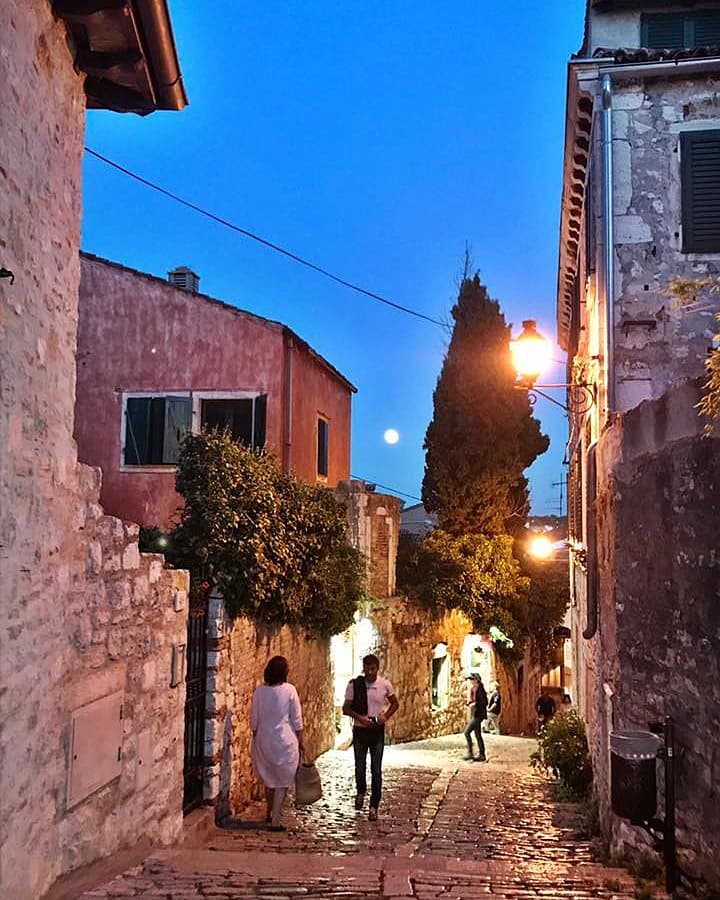
I took the suggestion of many local friends, one of whom has a friend in MUP Zagreb, and applied with letters from neighbors, local businesses I had helped, and even my local Catholic church. All to show that I had become a part of the community around me. But to no avail. I learned just days before my current visa expired that this humanitarian reason was not enough. I was denied. But in that “decision” from the Ministry in Zagreb was their suggestion that I reapply quickly (within 36 hours) using the new Digital Nomad Visa option as they could see that I qualified. Sadly, I was not given that letter to show you as it was an internal document from Zagreb to Labin MUP, but I was shown the section that offered the exact paragraphs in the Alien Act that were recommended.
4. Now - and I want you to give us as much detail as possible as there is a LOT of interest in this (you will forever be known as First Nomad Visa Lady...), take us through the process of what happened when you went to apply.

Okay, these details are spread about here in different answers. The documents I needed to provide:
1) Completed Form 1A provided by the MUP office, noting the reason of requested temporary stay as DIGITAL NOMAD, and the length of requested stay;
2) OIB (personal identification number);
3) Valid Passport that shows it is active beyond the timeframe requested in my visa application;
4) Written statement from me that I am a Digital Nomad with a company/work/clients outside of Croatia, why I want to stay/work in Croatia, how long I have been a digital nomad and any detail about my services. Specifically, I was told to reference “communications” and “technology” in my statement as services I provide as well as where the company I own is registered; and offering any detail about the names and locations of the companies I work with. This document was written by me in English but professionally translated into Croatian, then my signature was notarized by a local, Croatian notary;
5) Since I own my company (US-based) servicing clients in Mexico and the US, I was asked to provide a copy of my business registration, articles of incorporation, and proof that the company was active and in good standing. The latter was obtained online from the US state in which I originally incorporated my business in;
6) Written statement of some form from my employer, in this case, an Employment Agreement from my own company, stating that I work for the company, what role I service, what my annual salary is, and the term of my contract. This agreement needed to be stamped with the official company seal. This document was written by me in English but professionally translated into Croatian, then my signature was notarized by a local, Croatian notary;
7) Proof of health insurance coverage for the length of the visa term requested. In my case, I went to the HZZO office and got a statement from them that I was paid up. Otherwise, proof of the foreign health insurance coverage is required;
8) Proof of minimally 28,800 kuna sitting in my bank account at the time of application. Better, of course, if this was shown in a Croatian bank account. Otherwise, a statement from the foreign bank on their letterhead that this amount is in the account.
5. How long did the process last and what did it cost?
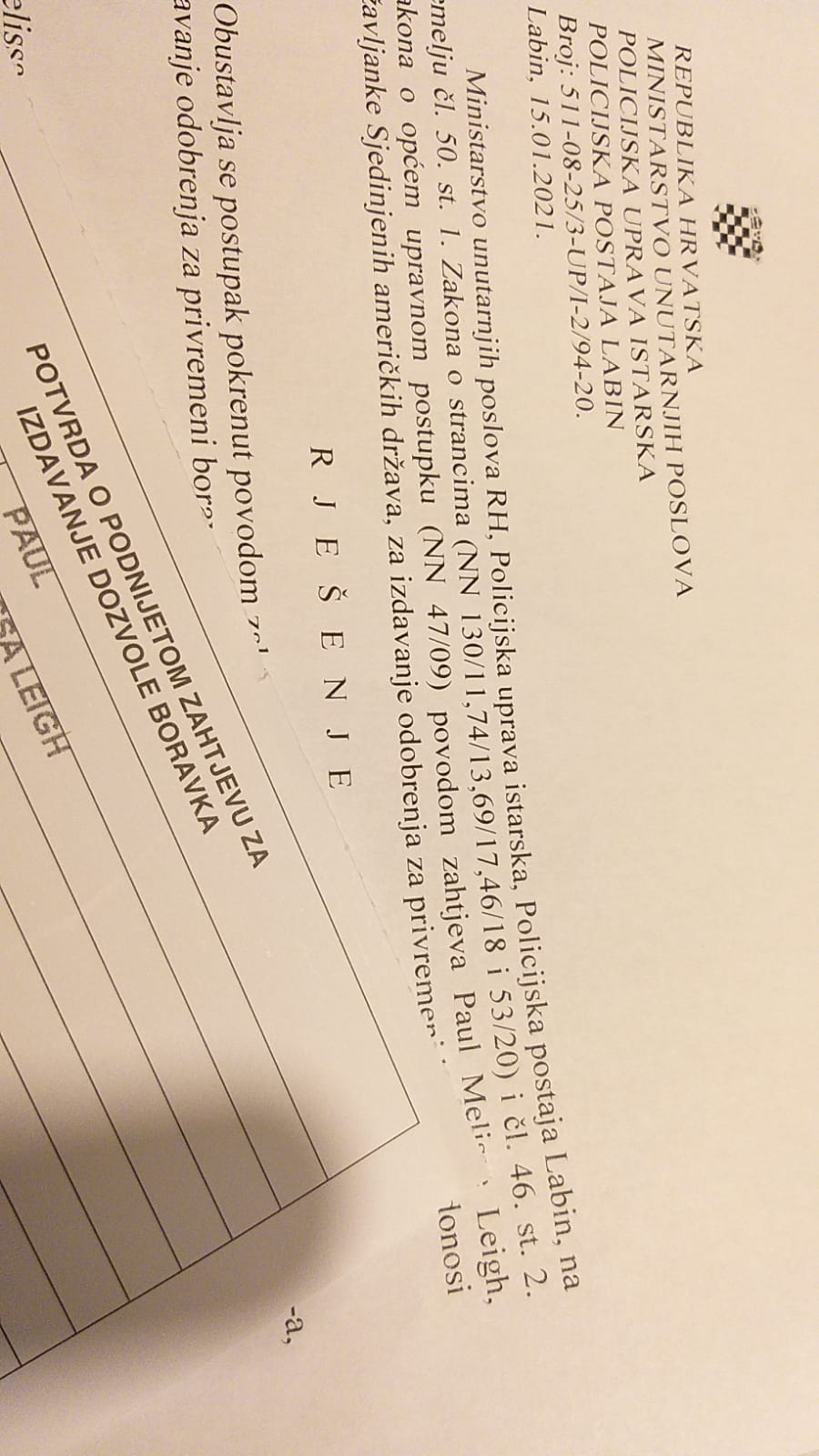
I applied in mid-November 2020 for my Temporary Stay and received a stamped letter from MUP Labin that the application was received and in process. On January 11th, 2021, I received a call at my home telling me I was denied and should come to their office in the police station immediately to discuss other options. I was told to bring a friend who spoke Croatian. I was there in an hour and they saw me immediately. I was shown the decision referenced above and it was read by my friend, and the suggestion to apply as a Digital Nomad was explained in detail. I was told I needed to get all the required documents back to MUP as soon as possible, and before my current visa expired in 4 days. I returned with all documents and ID/Passport photo. It was approved and I was given the decision, fee requirements and tax stamp requests. Tax stamps of 35 kuna were required and I paid 590 kuna for the visa application.
6. Is it actually a visa? Do you have a stamp or piece of paper you could share with us?
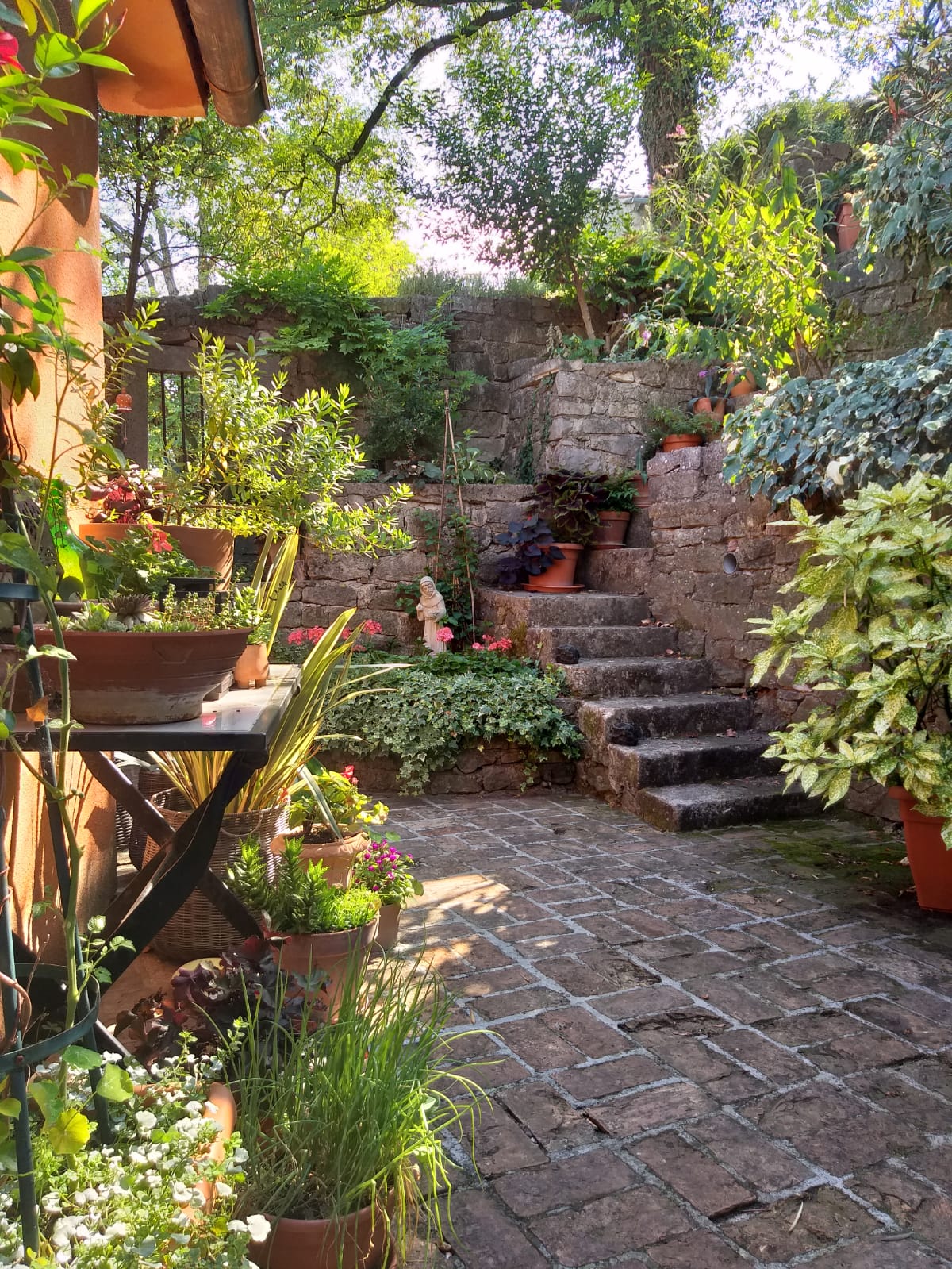
It is a reason to get a Temporary Stay Visa. So, the only document I have is the Rjesenje (decision) stating it was approved and the tariff stamp (tax stamp) of 35 kuna was due. Once I showed receipts from my bank that I paid the fee and brought back the tax stamps (available at a local Tisak) I was given a temporary white ID card and told to return in 3-4 weeks for the official card with photo.
7. When did you realise that you had become First Nomad Visa Lady - the first person to get the Croatian digital nomad visa?
My dear friend Isabel Putinja told me I must be the first, but I didn’t believe her! And then today I got a call from the Ministry in Zagreb who told me the article in TCN was about me… they asked if I would give them permission to use my name, etc.
8. Tell us how you feel now that you have it, and what are the exact conditions?
How I felt was GREAT RELIEF! To have the chance to stay here in Croatia for another year, and to not have to leave my home, my friends and neighbors, is amazing! Not to mention all the added complications COVID brings… I really have made my home here in Istria, but to have the opportunity to stay here while working remotely, is a gift. Truly! I have been a digital nomad for years and whether or not I own my home doesn’t negate the fact that I work for foreign companies while living on the other side of the world from them.
I have a new Privremeni Boravak for 12 months, which is the length of the DNVisa. It cannot be renewed or extended. When it expires, I either must have a stalni boravak (permanent residence) in place, a sexy Croatian or EU husband, or live out of Croatia for six months. (well, 3 months out, 3 months in as a tourist).
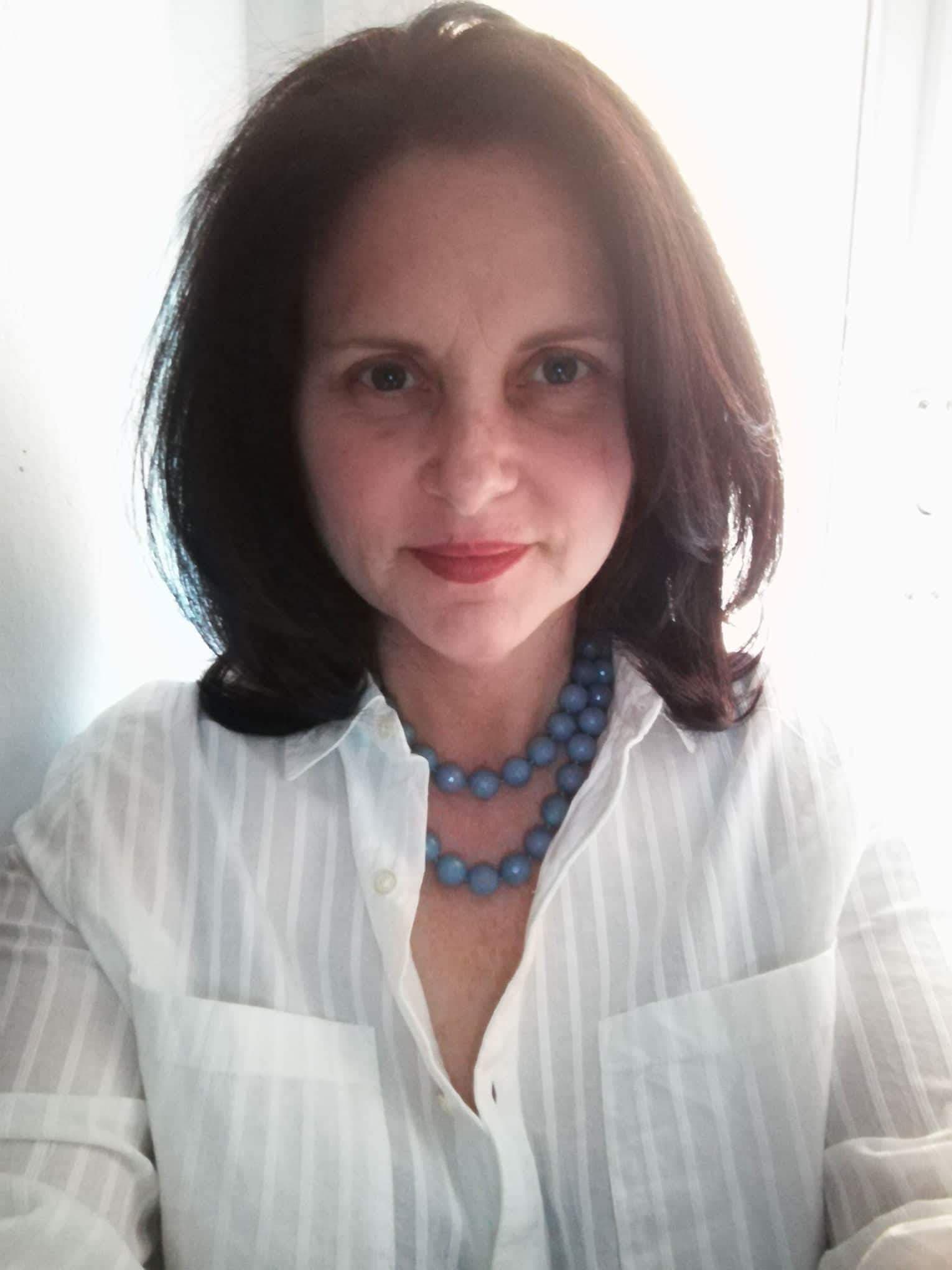
9. How have your plans changed now with regard to your stay in Croatia?
Getting my new temporary stay with the digital nomad reason means I can continue to write about Istria and Croatia, a personal project in the works for some time now. BUT, it affords me the opportunity to get a permanent stay visa as you must have one while the other is in process!
10. What advice do you have for others who are also looking to apply? What should they take with them to the police station?
Take a lot of patience with you, each time you go! And, someone who speaks fluent Croatian, as beginner’s Croatian is not enough for when faced with bureaucratic hurdles to jump! The best language is a smile, I found, but when I left frustrated I would be reminded that this is what it is, for everyone, and that it is not personal. I also believe going with everything copied already, translated and notarized is super helpful to speeding things up.
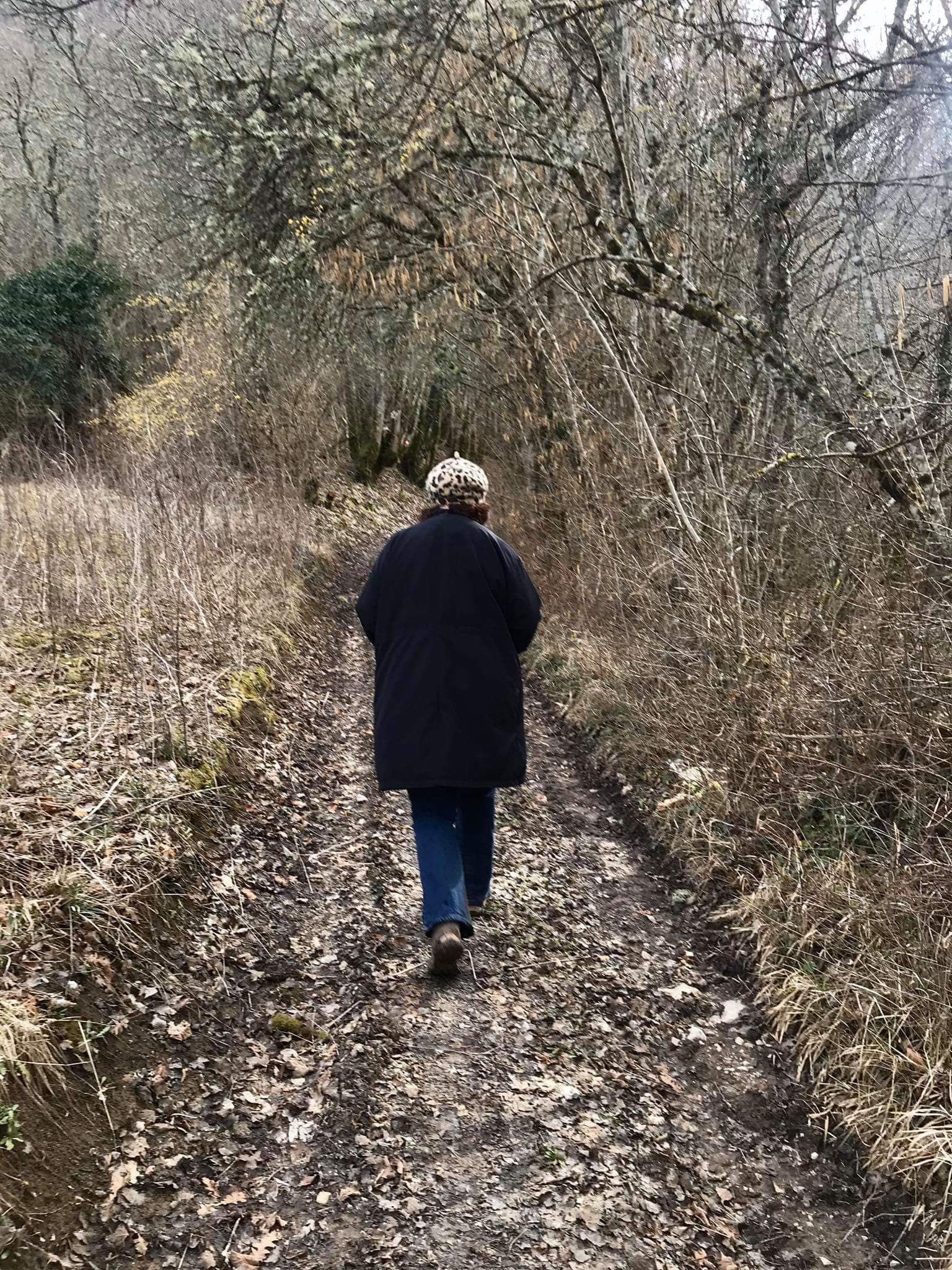
Fabulous stuff, and thanks, Melissa, for going into so much detail. You can follow Melissa Paul, Croatia's First Nomad Visa lady, on Instagram.
As I wrote in the earlier piece today announcing the first visa, the finishing touches are being applied to the process, including online registration forms. I would expect this all to be in place by the end of the first quarter of 2021, quite probably next month. We will bring you the latest in the dedicated TCN digital nomad section.
If you are applying for a digital nomad visa via your local police station and would like to share your experiences, please contact us at This email address is being protected from spambots. You need JavaScript enabled to view it. Subject Nomad Visa.
Pope Donates €100,000 to Earthquake Victims in Croatia
ZAGREB, 26 January (Hina) - Pope Francis has donated, through the Pontifical Council for Integral Human Development, 100,000 euros in earthquake relief to Caritas Croatia for the residents of the earthquake-hit region of Banovina in Sisak-Moslavina County, Caritas Croatia said on Tuesday.
The donation, made on January 11, is intended for Caritas Croatia for urgent relief and support to the earthquake victims.
The Pontifical Council for Integral Human Development sent the donation to Caritas Croatia via the Apostolic Nunciature in Croatia. The Apostolic Nuncio to Croatia, Msgr. Giorgio Lingua, informed the President of Caritas Croatia, Msgr. Bože Radoš, of the donation in writing.
"Caritas Croatia thanks the Holy Father Francis for his expression of proximity in prayer and material assistance that will provide warm and safe shelter to those left without roofs over their heads,” said Bishop Radoš.
This and other donations from legal entities, Croatian Catholic missions and private citizens, by direct personal payments or by calling the donation telephone number ++385 (0)60 9010 (6.25 HRK with VAT included), will be used for the procurement of housing modules and the urgently needed care of the earthquake victims.
So far, Caritas Croatia has contracted the delivery of 100 housing modules with the company Tehnix. The first deliveries began on January 16. The need for housing is still great. Caritas Croatia is purchasing another 100 new housing modules and invites contributions from all people of good will, says a statement on the website of the IKA Catholic news agency.
For the latest information on the earthquake emergency, follow the dedicated TCN section.
Prospective Buyers Conducting Due Diligence in DI Spačva Timber Company
ZAGREB, 26 January, 2021 - The timber company DI Spačva stated on Tuesday that prospective buyers had started conducting due diligence in this Vinkovci-based company.
"The process of due diligence has been launched by prospective buyers," the company said in a brief statement on the Zagreb Stock Exchange (ZSE).
The statement makes no mention of who the potential buyers are. The Spačva Group consists of five factories: a sawmill, a parquet production plant, a final products factory, a veneer factory, and a bio-fuels factory.
The current majority owner is Quaestus Private Equity Kapital II, which holds a 75.81% interest in the company. In late 2020, it announced its intention to sell its four million shares in Spačva.
Pervan and Barlinek potential buyers
After the fund's intention to sell those shares was announced on the ZSE in mid-October 2020, the media reported that one of the potential buyers was Darko Pervan, owner of Pervano Invest from Sweden and the Bjelin company, which has factories manufacturing flooring in the Croatian cities of Bjelovar, Ogulin and Otok.
Poland's Barlinek, a leading European manufacturer of layered wood floors, is also reportedly interested in taking over Spačva.
The financial statement for the first nine months of 2020 shows that Spačva reported HRK 184.5 million in revenue, and its expenditure totalled HRK 174.7 million. Thus, the profit in the January-September 2020 period came to HRK 9.86 million.
The sales revenues amounted to HRK 164.1 million, and two-thirds of the amount were secured through exports. Spačva's export markets are Italy, Romania, France, Serbia, Germany and Great Britain.
Currently, Spačva employs 850 workers, according to data available on the company's website.
(€1 = HRK 7.561842)
For the latest business news from Croatia, follow the TCN business section.
Plenković: Tušek Made a Mistake by Meeting with Šimunić
ZAGREB, 26 January, 2021 - Prime Minister Andrej Plenković on Tuesday commented on a meeting between HDZ MP Žarko Tušek and independent councillor Viktor Šimunić saying that Tušek had made a mistake by meeting with Šimunić at all, adding that he was not certain there were grounds for legal action.
"A grave political mistake, I don't know how that could have happened to him. He is an experienced politician, for him to go to a meeting and for it to end as it did. I will not go into the intentions of the gentleman who obviously lured him and Oroslavje mayor. In any case, this is a political mistake that should not have happened," Plenković told a press conference after a meeting of the parliamentary majority.
Šimunić told the 24 Sata daily that the Croatian Democratic Union (HDZ) tried to buy him off offering him support at the local election in May and a position in the Medvednica Nature Park. Šimunić secretly recorded the conversation and the daily made it public.
Tušek confirmed that the recording was authentic, describing it as an attempt to discredit him and the party, adding that he jokingly exaggerated the possibilities of Šimunić's engagement.
Plenković added that everything that was said during that meeting needs to be carefully analysed but based on Šimunić's "oeuvre", he cannot see what Tušek was supposed to to with him at that meeting and what sort of cooperation they could have agreed.
"I'm not certain if there are any grounds for accountability here, but seeing that this is about a recording, and that the conversation was conducted without any consultation with any one of us, radars do not work in holiday cottages, I can hardly believe something like that occurred," said Plenković, adding that he did not see any link between the HDZ's political platform and Šimunić.
With regard to public posts that are filled through public advertisements, which were mentioned in the conversation, Plenković said that he spoke briefly with Tušek and as far as he understood, his intention was not political bartering but that he jokingly exaggerated everything that could be done.
"It is evident that the gentleman led him with offside questions. This was done with aforethought to lure him into this situation. That is as clear as day," said Plenković.
Plenković said that for him as party leader the major problem was how Tušek had allowed himself to be put into such a situation to even sit in the same room with Šimunić. "What was said there doesn't mean anything in any case. The problem is that he was there in the first place," said Plenković.
For more on Croatian politics, follow the dedicated TCN section.
Tušek's Attorney Threatens Legal Action over Unauthorised Recording
ZAGREB, 26 January, 2021 - An attorney for HDZ MP Žarko Tušek said on Tuesday that he could file a criminal report against Viktor Šimunić, an independent councillor from Oroslavje, and against a journalist, for unlawfully recording and publishing Šimunić's conversation with Tušek.
Šimunić said earlier in the day that the recording, in which Tušek, who heads the HDZ branch in Krapina-Zagorje County, was offering him covert support in the campaign for local elections and employment in public institutions in exchange for supporting the HDZ after the elections, had been made and published in the interest of the public.
Tušek said that the recording, published first on the website of the 24 Sata daily, was authentic and that it was an attempt to discredit him.
Tušek's attorney Vladimir Terešak said that the unauthorised recording of a conversation and its publication contained "significant elements of a criminal offence" by the councillor who recorded the conversation and the reporter who made the recording public.
The attorney said the offence in question carried a penalty of up to three years in prison, noting that he would advise his client to report the unauthorised recording of his conversation to the prosecutorial authorities but that a final decision on the matter would be made in the next few days.
Responding to a reporter's remark that the unauthorised recording of a conversation was not a criminal offence if done in public interest, which is above private interest, Terešak told the N1 broadcaster that that was for the court to decide.
He believes that the recorded conversation did not contain any elements of influence-peddling and that an erroneous parallel was drawn between Tušek's case and the case of former Vukovar mayor Željko Sabo of the Social Democratic Party who was sentenced for bribe giving, the evidence proving it being a recording of his phone conversation.
"Tušek is not a government official, he is an MP, and this is a 'what if' case. Neither is the HDZ in power in Krapina-Zagorje County nor is Tušek in a position to make appointments as a member of parliament," said Terešak.
Sabo was a member of local government in Vukovar who was sentenced after elections for trying to buy off councillors while Tušek's case is about classic negotiations, said the attorney.
For the latest in Croatian politics, follow the dedicated TCN section.
Šimunić: I Published Recording of My Conversation with Tušek in Public Interest
ZAGREB, 26 January, 2021 - Viktor Šimunić, an independent councillor from Oroslavje, has said that the audio recording showing HDZ official Žarko Tušek offering him covert support in electioneering and public posts in exchange for his support for the HDZ platform, was made and published in the interest of the public.
"Where in the world is it normal to offer a man who works in the telecommunications sector the post of head of the Medvednica Nature Park or to be in charge of an economy department? I am not competent for that," Šimunić told the N1 broadcaster, speaking about why he had decided to make and publish the audio recording of his conversation with Tušek, which took place in Oroslavje.
He said that during their meeting, which happened in a holiday cottage of Oroslavje mayor Emil Gredičak on 16 January, Tušek, who is a member of parliament and heads the HDZ Krapina-Zagorje County branch, offered him covert help during the campaign in local elections in May as well as managerial posts in public institutions in exchange for his post-election support for the HDZ platform.
Šimunić said that he had had similar conversations with other parties in Krapina-Zagorje County but that he did not record them.
He said that his having recorded the conversation with Tušek was not a trap but that he opted for it because he had "read about all kinds of scandals implicating Tušek."
Šimunić said that he had been analysing the work of local government for a year and that by accepting the post he had been offered, he would have undone everything he had done so far.
Šimunić was visibly emotional while speaking about the motive for publishing the recording, saying that he did so for his nephews and country and to make people realise that Croatia was full of potential but that there was no end to corruption.
He said that his conscience was clear and that he did not know if he would run in the local elections but that he would continue working on his analysis of local government.
For the latest in Croatian politics, visit the dedicated TCN section.
Croatia's Energy Development to be Based on New, Clean Technologies
ZAGREB, 26 January, 2021 - The concept of Croatia's energy development must be based on new and clean technologies, innovation and research so as to improve the quality of life and ensure the necessary transformation of the economy, Prime Minister Andrej Plenković said on Tuesday.
He was speaking at a digital conference called "Energy 2021 - Managing the Green Transition".
Funds from the Next Generation EU instrument, which finances measures to mitigate the economic consequences of the coronavirus pandemic, and from the 2021-17 EU budget will provide a big incentive to economic and social progress and recovery, Plenković said.
That is significant for Croatia because it has managed to secure €24.5 billion, he added.
Almost €9.6 billion is expected from the Recovery and Resilience Facility, of which €6 billion in grants, with the possibility to use favourable loans totalling €3.6 billion, Plenković sad.
Another big source of EU assistance is regional policy funds for the 2021-27 period, including €9.15 billion at Croatia's disposal.
"The significance of those funds is reflected in the fact that they are at 16% of Croatia's GDP last year, which is the highest share in comparison with all other EU countries," said Plenković.
The funds that have been and will be ensured over the next ten years will drive the accelerated growth and stronger resilience of the Croatian economy through accelerated digitalisation, adoption of new technologies and, notably, the green transition, he said.
In carrying out those reforms and transformations, he added, we will follow the National Development Strategy which parliament will debate and adopt this week.
Plenković said that thanks to its hydropower potential and its wind and solar parks, Croatia met 29% of its energy needs, surpassing the renewable energy targets in the Europe 2020 strategy.
"Our goals are to enhance and optimise the power transmission and distribution grid, enable the use of new renewable energy sources, motivate innovative energy storage solutions and encourage the further use of biofuels, and we will also push for continuing the electrification of transport and introducing hydrogen as a new and different alternative fuel."
Plenković also mentioned the LNG terminal off Krk island, which has been operating commercially since 1 January, announcing that it would be officially inaugurated on Friday. The fact that its full storage capacity has been booked for the next three years and 84% until 2027 only confirms its business and geostrategic validity, he said.
He went on to say that the energy renewal of buildings would be encouraged in the period ahead and that the consequences of the devastating earthquakes that struck Croatia last year would be taken into account.
"We will channel funds into several components, putting emphasis on the green transition into which, under Recovery and Resilience Facility rules, it's necessary to invest at least 37% of those funds. We will give precedence to economic branches and industries that will help further develop the economy and make it more resilient and more competitive, in keeping with the green and digital transformation policies. Thereby we will provide citizens and the economy with more available, cleaner and cheaper energy, while preserving our natural resources."
Economy and Sustainable Development Minister Tomislav Ćorić said that Croatia, as all European economies, was going for a transition of its energy system.
The challenges of that transition are many, and the numerous and different parts of that system deal with them differently, notably the most traditional ones. The state-owned power supplier HEP is fully committed to transition and renewables, he added.
"We have taken a very clear strategic position, but the challenge lies in creating a grid that can absorb all that," Ćorić said.
He recalled that Croatia had opted for achieving climate neutrality by 2050, but added that keeping hydrocarbons to a certain extent was inevitable.
HEP CEO Frane Barbarić said the company would invest HRK 4 billion this year.
Fund for Radioactive Waste Disposal: Čerkezovac Complex Undamaged by Quake
ZAGREB, 26 January, 2021 - The former Čerkezovac military barracks on Trgovska Gora is not located in standardly active faults and all its facilities were undamaged during the recent earthquakes, the Fund for financing the disposal of radioactive waste from the Krsko Nuclear Power Plant said on Tuesday.
The underground storage facilities that are part of the former Čerkezovac barracks have been selected as a preferential site for the storage of low and medium radioactive waste because of its storage capacities that guarantee complete technical safety. The site is not prone to floods and it is sufficiently distanced from drinking water, the fund underlined.
Čerkezovac is not located in a zone of active faults and during the recent earthquakes all the facilities at Čerkezovac were undamaged, the fund added.
"The storage facilities for radioactive waste will be built according to EUROCODES 7 and 8 with an increased factor of safety so that they can withstand earthquakes with greater magnitudes than expected and so that structures at the centre can be safe during earthquakes with great destructive force," the fund said.
For the latest information on the earthquake emergency, follow the dedicated TCN section.
Young Croatian Skier Zrinka Ljutić Achieves First Victory in Europa Cup Races!
January 26, 2021 - Croatian skier Zrinka Ljutić achieved her first victory in European Cup races with a triumph in today's slalom held in Zell am See, Austria. It is also her 17th birthday!
Gol.hr reports that this is the first ascent to the podium in the European Cup for the 17-year-old from Zagreb, and she immediately reached the highest place on the same track where she was eighth the day before.
On Tuesday, with the starting number 9, she had the fourth time of the first run, and she was half a second behind the leading Italian skier Lara Della Meo.
In the second run, the Croatian skier achieved the second-best time, which was ultimately enough for a convincing victory over German Lena Duerr, the winner of the slalom held on Monday.
The first and second from the first run, Italian Della Mea and Swede Wikstroem, failed to finish the second run.
Duerr is also the only skier who managed to fall behind Ljutić by less than one second, while the third-placed Swede Liv Ceder was 1.08 seconds behind.
Zrinka Ljutić is now fifth in the ranking of slalom skiers in the European Cup with 233 points, and she is 232 points behind the leading Slovenian Andreja Slokar. Ljutić is also fifth in the overall standings with 270 points, where Slokar is also leading with 465 points, which she won in the slalom.
"Zrinka Ljutić celebrated her 17th birthday with her first victory in the Europa Cup. With a fantastic second run, Zrinka climbed from 4th place to the highest slalom spot in Zell am See (AUT)!
It's time to celebrate!" CroSki wrote on its Facebook.
To read more about sport in Croatia, follow TCN’s dedicated page.



